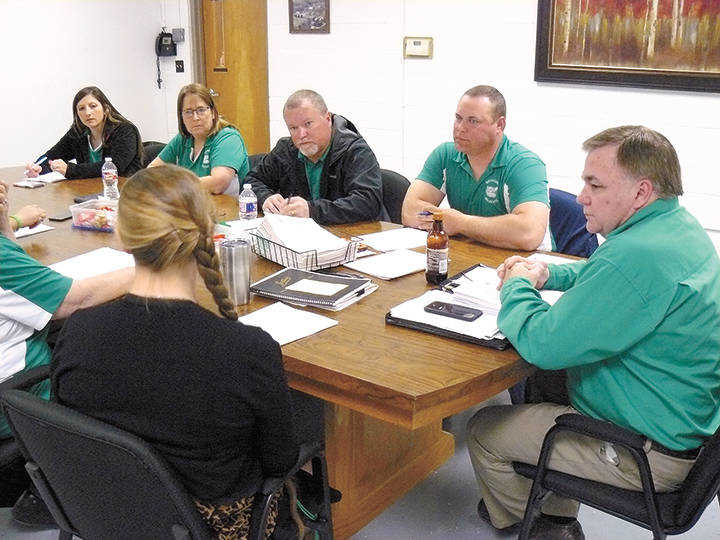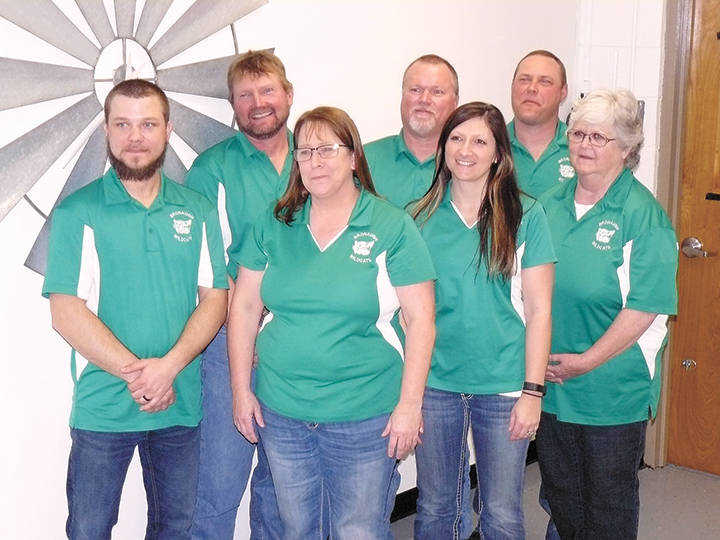Bronaugh R-7 board adopts new online program

With all seven board members present, Thursday’s one-hour open session of the Bronaugh R-7 school board focused on discussion of heating, ventilation, air-conditioning and lighting issues, heard an in-person program evaluation and approved a new program for student credit recovery.
At February’s meeting, the board received an enthusiastic overview for an online teaching program called “Launch,” created and operated by the Springfield, Mo., R-12 school district.
At that meeting, Principal Jordan Dickey said, “Right now we’re using Odysseyware for credit recovery and it’s not working for us. We paid $3,000 this year for it so if we switch it would not be until the next school year.”

The program provides extra courses not offered by Bronaugh as well as those which provide what is known as credit recovery, so students who either failed a class or failed to complete a class can complete work and recover the lost credit.
In last month’s overview of the program Dickey said, “What I really like about this is that the online classes are taught live, by real Missouri public school teachers and correspond to Missouri standards.”
She further explained that students have to log-in at the start of each class but if a student fails to do so on two successive days the teacher calls the student’s parents and the principal is notified as well.
At the March meeting Dickey said, “I’ve asked administrators from schools already using it and so far they say it seems to be doing all they say. For example, they really are calling parents and monitoring homework and following up with administrators, which I think is awesome.”
Asked about costs, Dickey said there is a $500 “buy-in” fee and then after that licenses are per course. For credit recovery each 12-month license is $150 while for credit acquisition — for a course not available that semester or not offered at Bronaugh — a 12-month license is $300.
“Each license is not per student but’s for a whole year which means we can switch students at the semester or even arrange for a special summer session,” said Dickey.
Districts using this program are encouraged to have their teachers sign-up to teach a course and earn additional money. The wide range of courses includes physical education. “They give you a FitBit and they monitor your work and you can take the classroom portion of diver’s education,” Dickey explained.
Asked if this could be an option for use by home school students and thus a way to count them as district students Dickey said, “We’d need to think that through carefully and write some policy guidelines first.”
“It sounds to me it’ll fill a lot of voids,” said board member David Diggins.
The rest agreed as approval was given by the board to have the district join this program for the next school year. Administrators were given flexibility to join earlier if a sudden need arises.
Under old business, the board returned to a discussion of heating, ventilation, air-conditioning and lighting.
Said Superintendent Dr. David Copeland, “While I don’t have firm bids on each component, it looks like the lighting part of the project, other than ag and the library, will run about $78,000 and the HVAC part could run anywhere from $75,000 to $150,000 depending on how much we do.”
As to securing a low-interest energy loan, the superintendent was told most districts pay less by borrowing from a local lender. He had inquired with one lender and was quoted an interest rate of 4.05 percent.
At this point, Copeland referred to an ongoing student/family matter and expressed a two-fold concern.
“I don’t feel comfortable going into debt until we get other matters resolved first,” said Copeland. “Besides, this district has been debt free for a lot of years.”
Board chair Ryan Linn agreed with Copeland adding, “There’s more information to get anyway and so let’s just table this for now.”
Other board members nodded their heads as Copeland expressed the hope that by August the other matter would be resolved and hard numbers on the project would be available for the board to review.
An in-person program evaluation was provided by grade six teacher, Abby Gilmartin. She ran down the various subjects and what they have been or are currently covering.
“In language arts, we’ve been doing a number of whole class reading of books,” said Gilmartin. “I’ve been very proud of my students as every one of them has met their Reading Counts goals every quarter this year.”
In math, she is introducing them to geometry while in science she is focusing on marine life in preparation for a field trip to Wonders of Wildlife Museum and Aquarium. In history, she covered the history of the ancient and modern Olympics.
Lori Baker, the R-7 school health clerk submitted a written report which highlighted the eye exams performed at school, flu shots given to 14 staff members, two rounds of the mobile dental clinic treating students on site along with two rounds of fluoride treatments.
“We went through two cases of cough drops through the winter months … cold and flu season hit us hard, but not as hard as some schools in our area,” noted Baker in her report.
Said Copeland, “Carl Junction schools were closed yesterday and today due to a pretty severe outbreak of Influenza B,” said Copeland. Staff used the day to wipe surfaces with bleach throughout their facilities and buses.”
Baker asked for a new audiometer for next year; she borrowed one from the Liberal R-2 district for use at Bronaugh this year.
“The last I talked with her, she wasn’t planning on coming back next year so we’ll have to decide how we want to handle that position,” reported Copeland to the board.
In his report, the superintendent said the onsite review of federal program records was scheduled to last from 9 a.m. to noon but was complete within 45 minutes with positive feedback.
“The next onsite inspection will be for special education later this month,” added Copeland.
At the urging of several patrons and board members, the superintendent said credit cards will be able to be used for payment of food service bills “as early as tomorrow or just after we get back from Spring Break,” said Copeland.
